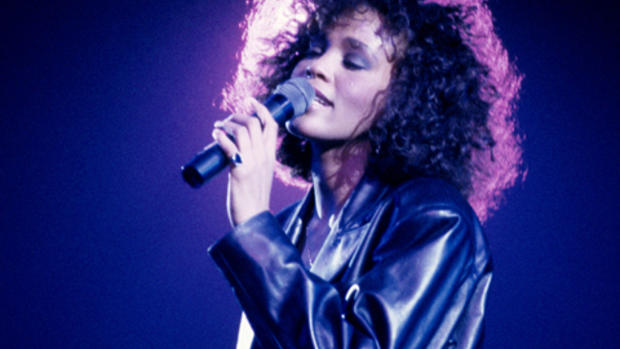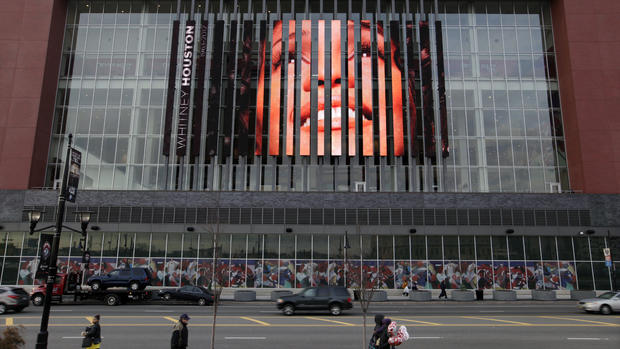Whitney Houston voice of post-civil rights era
She wasn't Etta or Aretha, and she certainly wasn't Diana (an artist from whom she vociferously distanced herself and who was, herself, at the Grammys, conspicuously grief-free when her time at the podium rolled around). She lacked the dangerous energy of Tina's high-octane routines and the erotic funk of Chaka at the peak of the "Soul Train" era. But in many ways she was the sum of all of those artists combined, rearranged and reimagined for the Reagan-Bush '80s. In those early, candy-colored "How Will I Know" years, riding the edge of her teens with sparkly bows and mile-high crimp locks, she channeled Etta's youthful chutzpah, yoked it with the Queen of Soul's vocal confidence and power and Tina's discipline and gently folded in a bit of Khan's sensuality so as to create a pop heroine the world had never before seen or heard at that point in time -- a black female Top 40-meets-MTV protagonist whose sound welcomed us to a bright new crossover world of what might be, where Huxtable brownstones and an emerging black middle class made cultural integration seemingly more palpable and more palatable to the masses for a brief moment in time.
Complete Coverage: Pop diva Whitney Houston dead at 48
Houston funeral Saturday at childhood church
Chaka Khan opens up about Clive Davis' gala
As the obituaries roll in and the tributes pour out about Whitney Houston's ability to hit those celebrated and "magical" high notes, surely the most overlooked of her many achievements as an artist is that she is perhaps the first black female artist to take the technical virtuosity of her skills culled in the church and successfully transpose them onto Arista-industry driven, market-tested Top 40 pop arrangements. Whereas even the Supremes worked their way up through a Motor City black-owned business that willed them to global stardom against the odds, and whereas a whole slew of "niche" artists (Natalie Cole on the R&B charts, Donna Summer on the Giorgio Moroder Euro-disco circuit) made the leap to the center, it was Whitney who emerged at the very center of '80s pop and then subtly and yet fundamentally changed its landscape forever. She made the aesthetics of black female vocalizing once and for all not only mainstream (as Aretha Franklin had done in the late '60s by way of her uncompromising Muscle Shoals soul) but also accessible to the masses, across age groups (the very young and the old who maybe didn't groove to "Bad Girls" at Studio 54; the teens and 20-somethings who saw a Seventeen magazine model girlfriend in the singer), and across racial groups, by delivering the good news of the gospel melisma in shiny pop music deemed "universal" rather than "distinctly African-American."
Whitney was dismissed by black cultural critics such as novelist Trey Ellis (in his infamous 1989 essay "The New Black Aesthetic") as inauthentic, and she was predictably overlooked by establishment rock critics little interested in her race, her gender or the pop music genre that she dominated (think, for instance, of her sole Rolling Stone cover's arriving in 1993, nearly a decade into her rein at the top of the charts). But nonetheless, she inspired a rainbow connection of Gen X and Y singers to belt across the colorline. The runs that she so coolly executed and bequeathed to multicultural Mariah, Christina and the legion of "TRL" acts and "American Idol"s who came after her have altered the standard of pop singing for good.
For a stint, that very fact was too much for R&B fans, like the ones who famously booed Clive Davis's golden girl at the 1989 "Soul Train" Awards. Less than enamored with her brand of smoky adult contemporary balladry and buoyant synth pop, black popular culture would wait until the Clinton '90s, would wait through "The Bodyguard" tsunami to embrace Cissy's daughter wholeheartedly and with open arms as she eased her way into an R&B universe transformed by hip hop and Terry McMillan novels. The reconstructed Whitney who "exhaled" and told her man that "it's not right, but it's okay," had found a way to wed a little bit of Newark, New Jersey, swagger with diva elegance and gospel conviction. Slipping effortlessly into Chaka's "everywoman" shoes, she stepped into the decade in which black popular culture most fully became global popular culture and musically asserted her breezy mastery of dance pop, hip hop soul and Wyclef Jean-diaspora carnival. The Whitney of the '90s was an Afro-pop cosmopolitan whose voice, at turns astonishingly supple and formidable, sinuous and striking, evoked an increasing fullness, warm sophistication and playful maturity -- all the more heartbreakingly ironic given the ways that her personal life began to come undone at that time.
Drawn as some may be to the tales told by gossip folk coming out in droves, the more compelling story of Whitney Houston resides in a voice that raises above the din of US magazine and E! network chatter and holds for us the history of post-civil rights era womanhood as it defiantly, regally and audaciously weaves its way through a world of both legislated racial equality and lingering systemic discrimination. Even in that most iconic of moments, the 1991 Superbowl "Star-Spangled Banner" performance, the woman with the imposing three-octave range would complicate the fraught symbolic meaning of that patriotic ritual by virtue of her sheer vocal power.No doubt there are still those who are uncomfortable with the "stars and stripes forever" jingoism ringing through the scene of Houston's rendition of the national anthem, all refulgent and exuding a kind of triumphant grandeur and authority that matched the bombast of the Bush I Persian Gulf war. With a stadium full of flag-waving fans and a military air force salute flying sky high, her strength and fierceness as a singer came to represent for so many (many -- but not all) how the nation wished to imagine its own victorious image during that fraught moment in time.
Like the women of that troubling film "The Help," one might presume that this Whitney is meant to "heal and nurture" a nation -- even though her rights and privileges as a black woman in America remain deeply circumscribed by legacies of racism and sexism. Scholar Farah Griffin reminds us of these ironies; how odd it is, for instance, that Houston, who as an African-American woman bears the historical burden of double-disenfranchisement -- along racial as well as gender lines -- should come to literally embody and sound out nationalist fervor at maximum volume.
As playwright Tony Kushner reminds in his epic drama "Angels in America," "the white cracker who wrote the national anthem knew what he was doing." "He set the word 'free' to a note so high, nobody can reach it. That was deliberate. Nothing on earth sounds less like freedom to me," says the black nurse Belize in the play.
Yet by not just hitting that note but living in it and by finally and absolutely killing it, Whitney Houston -- a black woman born just weeks before the March on Washington, raised by pioneering artists like mother Cissy, cousin Dionne and godmother Aretha -- willed herself into America's narrative of freedom and democracy through the sheer crushing command of her voice. That day, she staged a struggle on the battlefield of song and cemented her title as the voice of the post-civil rights era.
Daphne A. Brooks, a professor of English and African-American studies at Princeton University, is the author of "Bodies in Dissent: Spectacular Performances of Race and Freedom, 1850-1910" (Duke) and "Jeff Buckley's Grace" (Continuum). The opinions expressed in this commentary are solely those of the author.

